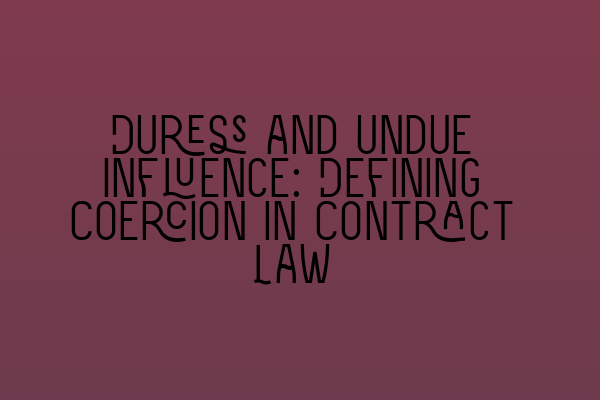Duress and Undue Influence: Defining Coercion in Contract Law
In contract law, the principles of duress and undue influence play a crucial role in determining the validity of a contract. These concepts help protect individuals from entering into agreements under circumstances that could be considered coercive or unfair. Understanding the legal implications of duress and undue influence is essential for both solicitors and clients alike.
Duress, in contract law, refers to situations where one party compels the other to enter into a contract through threats or acts of violence. It involves the use of force or fear to induce consent, essentially stripping the party of their free will. It is important to note that duress can be physical, economic, or emotional in nature.
Physical duress involves physical violence or threats of harm to oneself, one’s family, or one’s property. Economic duress, on the other hand, occurs when one party abuses their position of power to force the other party into entering a contract under economic pressure. Emotional duress refers to situations where one party exploits the other’s emotional vulnerability to manipulate them into a contract.
Undue influence, on the other hand, is a more subtle form of coercion. It occurs when one party exerts influence over the other party, taking advantage of a relationship of trust and confidence. Undue influence can be categorized as either actual undue influence or presumed undue influence.
Actual undue influence typically arises in relationships where one party has a strong hold over the other, such as relationships between family members, friends, or individuals with a significant power imbalance. In these cases, the dominant party uses their influence to overpower the decision-making ability of the other party, leading to the creation of an unfair contract.
Presumed undue influence, on the other hand, arises in certain special relationships, such as a solicitor-client or doctor-patient relationship. These relationships are considered inherently prone to undue influence due to the nature of the trust placed in the dominant party. In presumed undue influence cases, the burden of proof shifts to the dominant party to demonstrate that no undue influence was exerted.
To illustrate the implications of duress and undue influence, let’s consider a hypothetical scenario. John, a wealthy businessman, has been friends with Tom, a struggling entrepreneur, for years. John offers to lend Tom a significant sum of money for his business venture but imposes unfair terms in the contract, taking advantage of Tom’s desperate financial situation. In this scenario, the contract may be deemed voidable due to undue influence.
There have been several real-life cases that shed light on the application of duress and undue influence in contract law. For a deeper understanding of how these principles are applied in legal practice and decision-making, I highly recommend reading the article, “Unveiling Real-Life Case Studies: Insights into Legal Practice and Decision-Making”.
As a solicitor, it is crucial to ensure that your clients are well-informed about their rights regarding duress and undue influence. By mastering client relationship management skills, you can establish trust and loyalty, empowering your clients to make informed decisions. To enhance your client relationship management skills, check out the article, “Mastering Client Relationship Management: Skills for Solicitors to Enhance Trust and Loyalty”.
Furthermore, pursuing a law school education in the UK is essential for individuals aspiring to become solicitors. It is crucial to choose the right educational path that aligns with one’s future goals. To explore the various options and make an informed decision, I recommend reading the article, “Pursuing a Law School Education in the UK: Choosing the Right Path for Your Future”.
Once you have completed your law school education, securing training contracts is the next step toward becoming a solicitor. Understanding the roadmap to securing training contracts and navigating the application process is crucial. To gain insights into securing training contracts, I invite you to read the article, “Securing Training Contracts: A Roadmap to Becoming a Solicitor”.
In summary, duress and undue influence are essential legal concepts in contract law that aim to protect parties from entering into unfair agreements. By understanding these principles and their implications, solicitors can effectively guide their clients and ensure the validity and fairness of contracts. For more information on related topics, please refer to the articles mentioned above.
